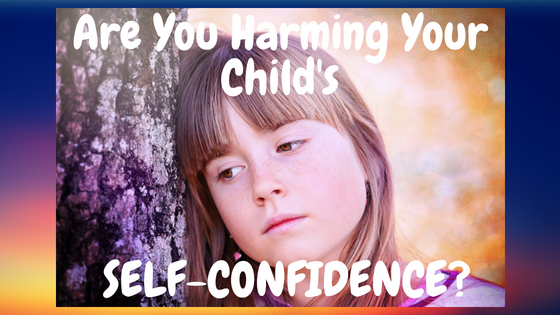
As a parent, you want the best for your child. But the way you guide your child, and the way you speak and behave around them, may be affecting their self-confidence. Even the things you do that are well-meaning may be having a negative effect on their self-esteem. As a consequence, you may be the instigator of health issues now or in later life that directly correlates to low esteem, including self-harm and depression. It’s a terrible thought, we know, but while we understand that parenting isn’t easy, you can still put right any mistakes you may have been making.
This is a contributed post and do not necessarily reflect the opinions of Meet The Harris Family.
Of course, none of us are perfect. There is no ‘perfect parent,’ no matter what image those other moms convey at the school gate every morning. Don’t feel guilty if you relate to anything we say in this article, but do strive to make amends. The following are some of the ways you may be harming your child’s confidence levels. Perhaps today is the day you turn things around, for their sake.
You spend too much time on their failings
You’re not perfect, and neither is your child. But if you scold them every time they make a mistake in life, you are going to harm their confidence levels. If you remind them of their failings even above and beyond the positive things they have achieved, you are going to perpetuate feelings of low self-esteem. Therefore, be mindful in what you say. If your child does something wrong (and is naughty), don’t let things get personal. Focus on the bad behavior and not your child. If your child has apologized for something, don’t keep dragging the incident up in later arguments. And if your child genuinely isn’t good at something, don’t always push them into trying harder. As you know from your life, we aren’t all good at everything.
Instead, focus on your child’s good points. When they do something well, congratulate and reward them. If they fail, rather than scold or berate them, help them to be better. Offer words of kindness and grace instead of words that will only inflict them harm. Be a proud and caring parent, rather than be somebody who is overly critical and demanding.
You are instigating health problems

As the parent, you need to encourage your child to follow healthy habits. But if you are feeding your child junk meals, allowing them to eat too many sweets, and spending too much time at the supermarket filling your trolley with bad foods and drinks rather than healthier ones, you are going to cause your child problems. The consequence of bad dietary habits include weight and dental hygiene issues. Not only are you harming your child’s health, but you are also instigating the risk of bullying, and consequently harming your child’s self-confidence at school. Therefore, learn how to cook healthy recipes. Don’t give into your child every time they want something that isn’t good for them. And book in regular visits to the doctor and dentist to keep their health needs on track. Health problems can lead to poor self-confidence regardless of school bullying, so as the parent and as the role model, ensure your child’s physical well-being (as well as their emotional well-being) is your priority.
You do everything for your child
As the parent, this may be your natural reaction, but you are causing problems. Your child will never learn independence or become self-confident if you are forever doing things for them. Instead, teach your child how to do certain things, from tying their shoelaces to anything related to their homework. Don’t lose patience if they don’t learn at the rate you want them to, and as a consequence complete the task for them. The more you do for them, the less they will do for themselves. They need space to think for themselves, problem solve, and if need be, make mistakes. It’s how they will learn to better themselves, so provided they aren’t in any danger, stop interfering.
You control your child’s life
As a continuation of the above, you might micromanage every aspect of their lives. You choose what friends they play with, what hobbies they take part in, and anything that takes away the option to decide for themselves. In short, you are a controlling parent, and that will affect their self-confidence today and well into the future. Instead, give them choices in their life. Don’t tell them who they can and can’t play with, unless their friends are particularly problematic. Don’t ignore your child’s dreams and passions. Choose to support them in what hobbies they want to do rather than dictate your wants for their life. While you will need to control some aspects of your child’s life (until they get to a certain age), you can still put safeguards in place while still giving them the opportunity to make decisions for themselves.
You compare your child to others
Here is something a lot of parents are guilty of. They compare their child to themselves (when they were their age), to siblings, or to their peers at school. But here’s the thing. If you are forever comparing your child to somebody else in a negative way, you are teaching them that they aren’t good enough! You are teaching them that other people are better than they are. And by doing so, you are enforcing feels of inadequacy and low self-esteem. Teachers are guilty of it, the world is guilty of it, but you don’t have to be. Instead, focus on the positive aspects of your child, and let them know these things. Let your child know how special and unique they are. And while you should encourage your child to have positive role models, you shouldn’t condemn them if they fall short of these other people.
Finally
Don’t let this article affect your self-confidence as a parent, but let it shape the way you approach your parenting. In the same way, don’t hurt your child’s self-confidence, but rather shape the way they grow up by following some of the advice we have given you here. By starting a better approach today, you will give your child the skills they need to live a better tomorrow.
